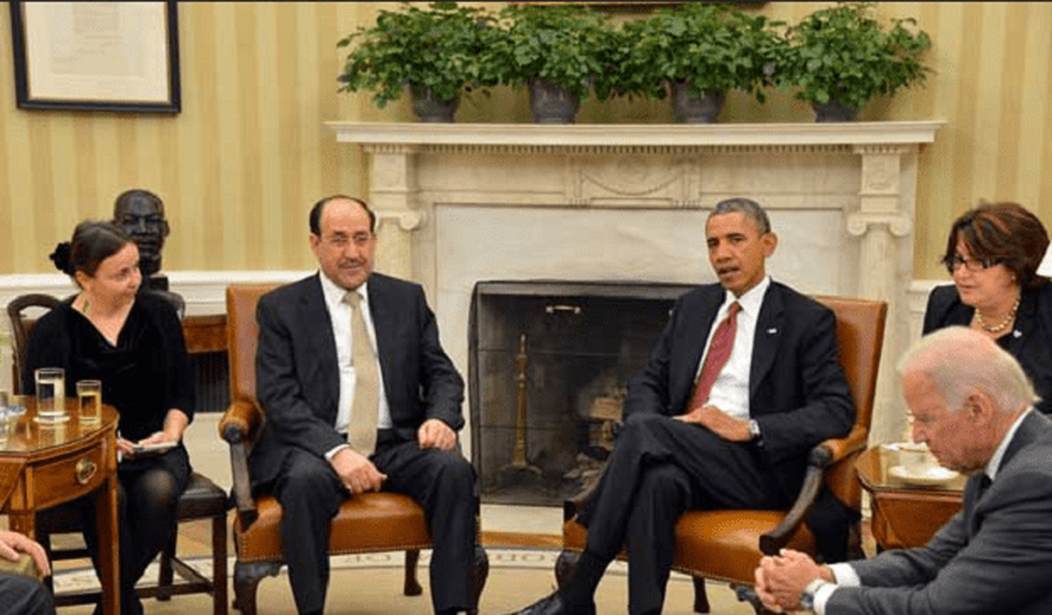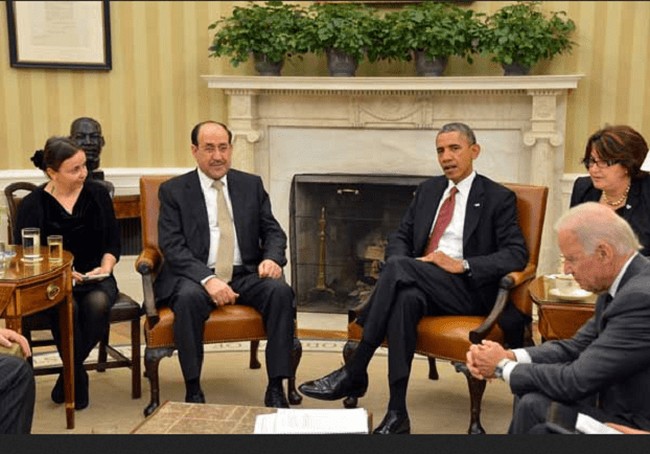As Iraq looks to be on the cusp of dissolution, the administration has decided that the man most responsible after Barack Obama, Iraqi Prime Minister Maliki needs to spend more time with his family. From the Wall Street Journal article U.S. Signals Iraq’s Maliki Should Go:
The Obama administration is signaling that it wants a new government in Iraq without Prime Minister Nouri al-Maliki, convinced the Shiite leader is unable to reconcile with the nation’s Sunni minority and stabilize a volatile political landscape.
The U.S. administration is indicating it wants Iraq’s political parties to form a new government without Mr. Maliki as he tries to assemble a ruling coalition following elections this past April, U.S. officials say.
But, of course, the idiocy continues:
To support the administration approach, Secretary of State John Kerry and his aides have consulted with Iraq’s neighbors—particularly Saudi Arabia, Turkey and Iran—to find a formula to create a more inclusive government in Baghdad.
The State Department’s point man on Iraq, Deputy Assistant Secretary Brett McGurk, has concurrently been meeting with Iraqi politicians and religious leaders in Baghdad to promote this political process, say U.S. officials.
Not only is Iran, a named state sponsor of terror and the one country doing most to fuel the ethnic violence, brought to the table but also Saudi Arabia who, if history is any guide, is probably up to its eyebrows in funding ISIS. To add to this rather exotic stew of #FAIL is Brett McGurk. To RedState readers, the name Brett McGurk should ring bells. He was nominated to be Ambassador to Iraq but withdrew his nomination when it came to light that he viewed his trips to Baghdad more as sex tourism than diplomacy.
What is glossed over is that not only did we have the chance to get rid of Maliki in 2010… quick, who was Secretary of State when this happened?… we elected to foist him off on the Iraqis. From Dexer Filkins’s epic New Yorker piece called What We Left Behind:
In September, 2010, with the Iraqi government stalled by inconclusive parliamentary elections, a group of political leaders was invited to the Iranian holy city of Qom for a celebration of the Eid al Fitr holiday. Once there, they were quietly summoned to a meeting of another sort. Their host was Qassem Suleimani, the head of the Quds Force, the Iranian paramilitary corps. For nearly a decade, Suleimani had loomed over Iraq as a powerful, shadowy influence: he had flooded the country with agents, brokered political deals, and smuggled in sophisticated bombs to kill American soldiers. Iran’s goals in Iraq were twofold: to bleed the Americans and to bolster the power of its Shiite clients.
In parliamentary elections the previous March, Maliki’s Shiite Islamist alliance, the State of Law, had suffered an embarrassing loss. The greatest share of votes went to a secular, pro-Western coalition called Iraqiya, led by Ayad Allawi, a persistent enemy of the Iranians. “These were election results we could only have dreamed of,” a former American diplomat told me. “The surge had worked. The war was winding down. And, for the first time in the history of the Arab world, a secular, Western-leaning alliance won a free and fair election.”
But even though Allawi’s group had won the most votes, it had not captured a majority, leaving both him and Maliki scrambling for coalition partners. And despite the gratifying election results, officials said, the Obama Administration concluded that backing Allawi would be too difficult if he was opposed by Shiites and by their supporters in Iran. “There was no way that the Shia were not going to provide the next Prime Minister,” James Jeffrey, the American Ambassador at the time, told me. “Iraq will not work if they don’t. Allawi was a goner.”
Shortly after the elections, an Iraqi judge, under pressure from the Prime Minister, awarded Maliki the first chance to form a government. The ruling directly contradicted the Iraqi constitution, but American officials did not contest it. “The intent of the constitution was clear, and we had the notes of the people who drafted it,” Sky, the civilian adviser, said. “The Americans had already weighed in for Maliki.”
There is absolutely nothing we have learned about Maliki since 2010 that we didn’t know beforehand and if Iraq could not work without Maliki in 2010 what makes us think it can work now without him? Now that we have no political or material influence with Maliki — we can do him neither harm nor good — how do we convince him to leave?
The mind simply boggles at the galactic level of boneheaded incompetence of this administration.













Join the conversation as a VIP Member